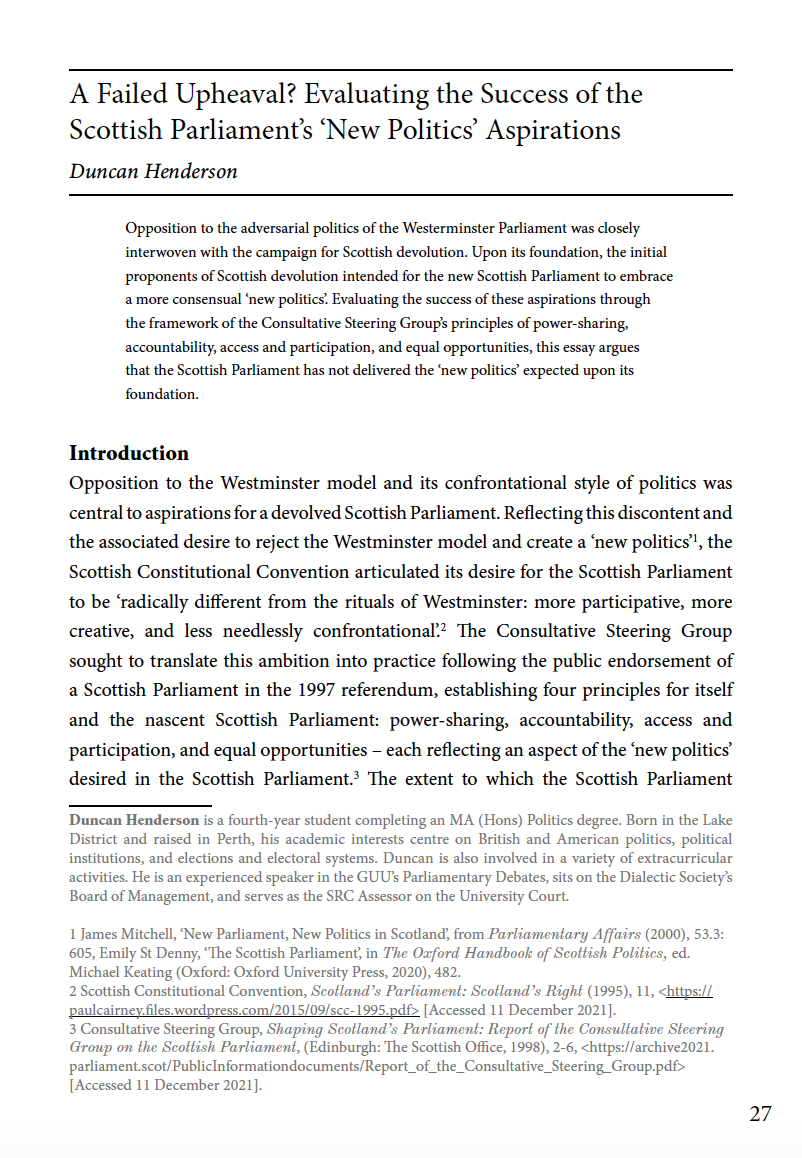A Failed Upheaval?
Evaluating the Success of the Scottish Parliament’s ‘New Politics’ Aspirations
DOI:
https://doi.org/10.36399/GroundingsUG.13.150Keywords:
Scottish Politics, Devolution, British Politics, British Constitution, New Politics, Scottish ParliamentAbstract
Opposition to the adversarial politics of the Westerminster Parliament was closely interwoven with the campaign for Scottish devolution. Upon its foundation, the initial proponents of Scottish devolution intended for the new Scottish Parliament to embrace a more consensual ‘new politics’. Evaluating the success of these aspirations through the framework of the Consultative Steering Group’s principles of power-sharing, accountability, access and participation, and equal opportunities, this essay argues that the Scottish Parliament has not delivered the ‘new politics’ expected upon its foundation.
References
BBC News, Alex Salmond inquiry ‘cannot proceed due to obstruction’, (2020),<https://www.bbc.co.uk/news/uk-scotland-scotland-politics-54343018> [Accessed 14 December 2021].
BBC News, Alex Salmond urged to appear at Holyrood inquiry, (2021), <https://www.bbc.co.uk/news/uk-scotland-scotland-politics-55663514> [Accessed 15 December 2021].
BBC News, Why are there so few ethnic minority MSPs?, (2020), <https://www.bbc.co.uk/news/uk-scotland-53322950> [Accessed 14 December 2021].
Breitenbach, Esther, ‘Scottish Women and Political Representation in the UK and Scottish Parliaments (1918–2020)’, Open Library of Humanities, 6:2 (2020), p. 1-38.
Brown, Alice, ‘Designing the Scottish Parliament’, Parliamentary affairs, 53:3 (2000). pp. 542-556.
Cairney, Paul, ‘The analysis of Scottish Parliament committee influence: Beyond capacity and structure in comparing West European legislatures’, European Journal of Political Research, 45:1 (2006), pp. 181-208.
Cairney, Paul & Widfeldt, Anders, ‘Is Scotland a Westminster-style Majoritarian Democracy or a Scandinavian-style Consensus Democracy? A Comparison of Scotland, the UK and Sweden’, Regional and Federal Studies, 25:1 (2015), pp. 1-18.
Carman, Christopher, ‘Barriers are Barriers: Asymmetric Participation in the Scottish Public Petitions System’, Parliamentary affairs, 67:1 (2014), pp. 151-171.
Carrell, Severin, ‘Alex Salmond’s Scottish independence referendum bill ‘dead in the water’, The Guardian, (2009). <https://www.theguardian.com/politics/2009/mar/05/snp-independence-referendum-plan-rejected> [Accessed 15 February 2022].
Consultative Steering Group, Shaping Scotland’s Parliament: Report of the Consultative Steering Group on the Scottish Parliament, (Edinburgh: The Scottish Office, 1998), p. 2-6, <https://archive2021.parliament.scot/PublicInformationdocuments/Report_of_the_Consultative_Steering_Group.pdf> [Accessed 11 December 2021].
Crawford, Bruce, ‘Ten Years of Devolution’, Parliamentary affairs,63:1 (2010), pp. 89-97.
Harvey, Malcolm, ‘Devolution’, in Michael Keating (ed.), The Oxford Handbook of Scottish Politics. (Oxford: Oxford University Press, 2020), pp. 371-385.
Kenny, Meryl & Mackay, Fiona, ‘Women, Gender, and Politics in Scotland’, in Michael Keating (ed.), The Oxford Handbook of Scottish Politics. (Oxford: Oxford University Press, 2020), pp. 59-77.
Lijphart, Arend, Patterns of democracy, (New Haven: Yale University Press, 1999).
Lundberg, Thomas C., ‘Politics is Still an Adversarial Business: Minority Government and Mixed-Member Proportional Representation in Scotland and in New Zealand’, British Journal of Politics and International Relations, 15:4 (2013), pp. 609-625.
Mabbett, Deborah, ‘Testing the Limits of Elective Dictatorship’, The Political Quarterly,91:4 (2020), pp. 701-704.
Mackay, Fiona & Kenny, Meryl, ‘Women’s Representation in the 2007 Scottish Parliament: Temporary Setback or Return to the Norm’, Scottish Affairs, 60 (First Series):1 (2007), pp. 80-93.
Hector MacQueen, ‘A Second Chamber for the Scottish Parliament?’, Scottish Affairs, 24:4 (2015), pp. 432-451.
Mitchell, James, ‘New parliament, New Politics in Scotland’, Parliamentary affairs. 53:3 (2000), pp. 606-621.
Mitchell, James, ‘The Narcissism of Small Differences: Scotland and Westminster’, Parliamentary affairs,63:1 (2010), pp. 98-116.
National Records of Scotland, Scotland’s Census 2011: Ethnic groups, Scotland, 2011, (2011), <https://www.scotlandscensus.gov.uk/bulletin-figures-and-tables> [Accessed 15 December 2021].
Pearce, Timothy, ‘The Journey to a More Diverse Scottish Parliament’, Centre on Constitutional Change, <https://www.centreonconstitutionalchange.ac.uk/news-and-opinion/journey-more-diverse-scottish-parliament> [Accessed 17 February 2022].
Scottish Constitutional Convention, Scotland’s Parliament: Scotland’s Right (1995), p. 11, <https://paulcairney.files.wordpress.com/2015/09/scc-1995.pdf> [Accessed 11 December 2021].
Scottish Parliament, Bills and laws, (2021), <https://parliament.scot/bills-and-laws/bills> [Accessed 14 December 2021].
Scottish Parliament Information Centre, Election 2007, (2007), <https://archive2021.parliament.scot/SPICeResources/Research%20briefings%20and%20fact%20sheets/SB07-21.pdf> [Accessed 4 March 2022].
St Denny, Emily, ‘The Scottish Parliament’, in Michael Keating (ed.), The Oxford Handbook of Scottish Politics, (Oxford: Oxford University Press, 2020), pp. 482-499.
Uberoi, Elise, and others, ‘Women in politics and public life’, House of Commons Library, HC 01250, 2019-Present, (2021), <https://commonslibrary.parliament.uk/research-briefings/sn01250/> [Accessed 15 December 2021].
UK Parliament, How petitions work, (2021), <https://petition.parliament.uk/help> [Accessed 15 December 2021].
White, Hannah, ‘In contempt? Witnesses before select committees’, Institute for Government, (2016), <https://www.instituteforgovernment.org.uk/blog/contempt-witnesses-select-committees> [Accessed 15 December 2021].

Downloads
Published
Issue
Section
License
Copyright (c) 2022 Duncan Henderson

This work is licensed under a Creative Commons Attribution 4.0 International License.
The CC BY 4.0 license is a Creative Commons license. This is a non-copyleft free license that is good for art and entertainment works, and educational works. It is compatible with all versions of the GNU GPL; however, like all CC licenses, it should not be used on software. People are free to: Share — copy and redistribute the material in any medium or format; Adapt — remix, transform, and build upon the material for any purpose, even commercially. The licensor cannot revoke these freedoms as long as you follow the license terms. But they must conform to the following terms: Attribution — You must give appropriate credit, provide a link to the license, and indicate if changes were made. You may do so in any reasonable manner, but not in any way that suggests the licensor endorses you or your use. No additional restrictions — You may not apply legal terms or technological measures that legally restrict others from doing anything the license permits.
Please check individual article PDF copies to see if any additional restrictions apply.







